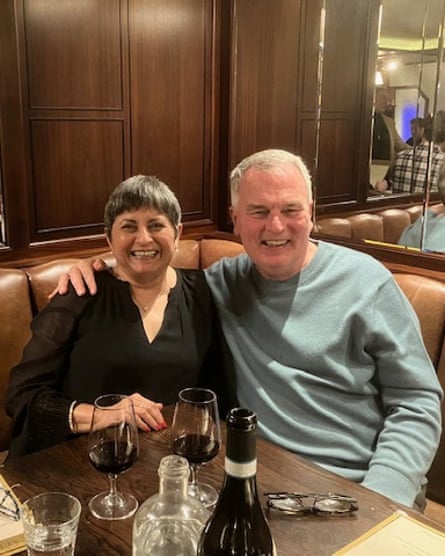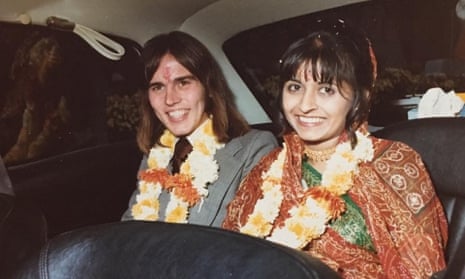Tom was enjoying Christmas in his home town of Leicester when he first started chatting to Vishva. “I was in my first year at Goldsmiths, University of London – and back for the holidays,” he says. “I was invited to my old college end-of-year party because I had been student union president.”
This was December 1972, and the college had arranged a lunchtime get-together at a local pub. “I walked in and saw Vishva, who was the most beautiful woman there,” he says. “She looked uncomfortable and I later realised it was because some old guy was trying to harass her.”
He sat down at Vishva’s table and they began to chat. Relieved to escape the man’s unwanted attentions, she says it was “really nice” to meet Tom. “I wasn’t meant to be in a pub because I come from a Hindu background, but I’d gone with friends. If anyone who knew my parents had seen me going in, I’d have been in trouble.”
They talked for the rest of the afternoon, but she couldn’t stay out late. “Vishva was studying at my old college but had a Saturday job at a department store,” says Tom. “We met up a few times in town over the holidays and slowly began to realise how much we enjoyed each other’s company.” On New Year’s Eve, they went out with a group of mutual friends and kissed for the first time when the clock struck midnight.

After the party, he walked her to the bus stop, where a car pulled up. “It was her dad. She immediately moved away from me and that was the first time I realised that going out with an Asian woman in the early 70s in Leicester was going to be difficult,” says Tom.
Despite the cultural challenges, they were determined to continue their relationship. Tom returned to university, but they wrote to each other and spoke on the phone. “I would go to the phone box down the road,” says Vishva, who knew her parents wouldn’t approve. “We had a landline at home but my mother would have asked who I was calling. I didn’t want to lie.”
The closer they grew, the more difficult it was to hide. “She wanted to see me but didn’t want to deceive her parents,” says Tom. “It put her under a huge strain, which I don’t think I fully appreciated at the time.”
Knowing their relationship would not be accepted by Vishva’s family, they decided the only way ahead – and to prove they were serious – was to get married. “We knew it would be difficult because we were still students, but it was what we wanted,” he says. When they told her parents, Tom says, “all hell broke loose and they said no straight away”.
Vishva’s extended family were brought in to persuade them against the union. Tom’s family, who knew little about Hindu culture, also voiced concern. By the end of the summer, Vishva was ready to give up. “That’s when my step-grandmother – who is now 102 – got involved and told my parents to let us get married. I don’t know if I would have gone ahead otherwise, due to the pressure.” They celebrated that autumn with both a civil ceremony and traditional Hindu wedding, almost unheard-of for mixed marriages at the time. “It was in Sanskrit and one of Vishva’s uncles led me through the ceremony,” says Tom.
They moved to London, where Tom was at university, and both completed their studies. Tom went on to work for a housing association, eventually becoming a chief executive, while Vishva was a maths teacher and later developed educational access and anti-racism programmes. The couple moved around the north of England and the Midlands over the next two decades, before eventually settling in Warwickshire in 2002. They have a son, Kieran, born in 1983. “He is a symbol of our love across the divide. His name means dark one in Gaelic and ray of light in Sanskrit,” says Tom.
Fifty years since their marriage, Tom says his wife is as beautiful as ever. “She’s the kindest person I know. She has supported me through the bad and the good and is a wonderful mother to our son. Every year, on our anniversary, I joke about how people said it wouldn’t last – but we’re still having date night every Friday.”
Vishva says that although her parents were ostracised by some family members at the time, Tom was eventually accepted. “We listen to each other and talk about issues that come up. We have this respect – we love and care for each other. We feel very lucky to still be here and still be together.”
